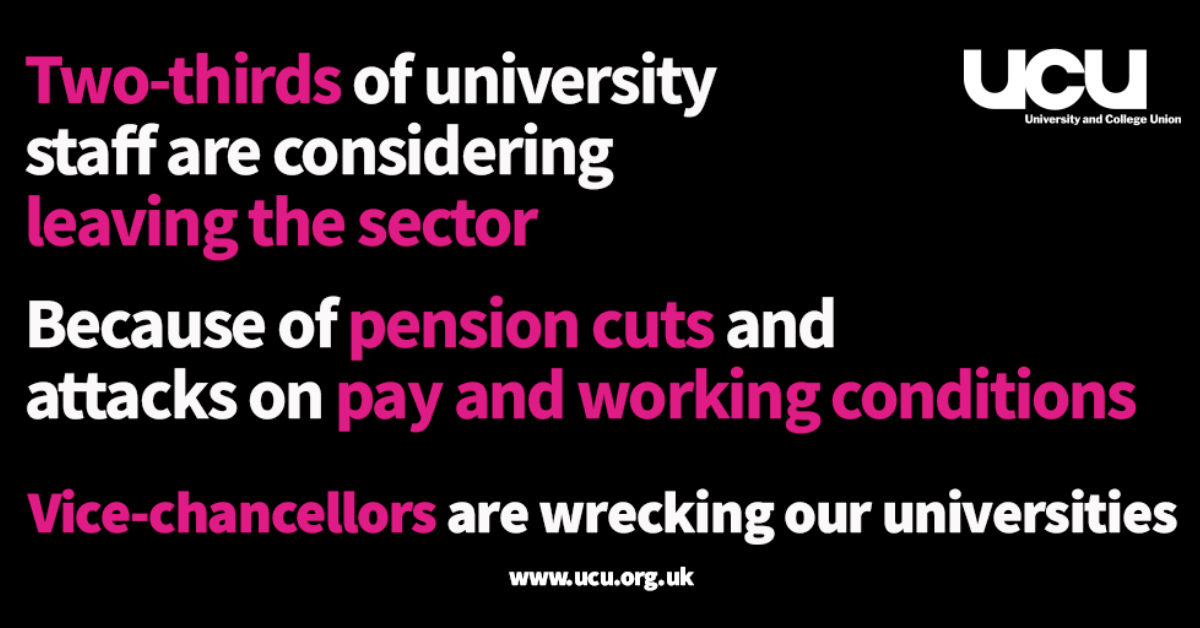
Two-thirds of university staff considering leaving sector, new report reveals
25 March 2022
UCU warned of a staff exodus from UK universities after two-thirds of university staff said they are considering leaving the sector within five years over cuts to pensions and deteriorating pay and working conditions.
The finding comes from a new UCU report 'UK Higher Education - a workforce in crisis' based on a survey of almost 7,000 university staff at over 100 institutions.
UCU accused university vice chancellors of putting the future of UK higher education and its foundational purpose at risk after the survey showed 81% of staff aged between 18 and 29 are likely or very likely to leave the sector in the next five years over deteriorating pay and working conditions.
UCU also sounded a warning about the UK's status as an international leader on research with almost three in four researchers saying they will leave higher education over pay and working conditions. For postgraduate students, this figure is four in five.
In the report, which has been sent along with letters to university employers, the secretary of state for Education and chair of the parliamentary education select committee, the union points to a 'decade in decline for pensions, pay and working conditions' as the drivers behind worsening staff morale. Around 70,000 academic staff are on insecure, fixed-term contracts whilst pay for has fallen by 25.5% in real terms since 2009. The typical member of staff was already set to be £240,000 worse off because of changes to their Universities Superannuation Scheme (USS) pension since 2011 and is now set to lose a further 35% from the guaranteed retirement income they will build up in future.
Throughout the survey, respondents report a crisis in morale in universities. The majority (57%) are unhappy about spending their career in higher education whilst 88% have no optimism for the future of the sector. Work overload was a consistent theme with a number of respondents reporting issues with their mental health as a result. In the report, 2,036 respondents detailed their personal experiences, describing how angry and demoralised they feel at work. This follows a previous report by Education Support in October last year which revealed that half of university staff were reporting signs of probable depression as a result of work pressures.
UCU also warns of UK higher education 'brain drain' as thousands of highly educated staff make plans to leave. Respondents report making preparations to stay within higher education but to do so by moving overseas.
UCU says universities must invest in their workforce to arrest this decline and prevent an 'exodus' of staff in the coming years and to ensure the sector does not become 'increasingly unattractive' to new staff.
UK university staff are currently taking their third wave of strike action this academic year in two separate disputes. The first is over the USS pension cuts to and the second is over deteriorating pay and working conditions.
The survey was conducted from 25 February - 2 March, just days after university employers in the USS pension scheme voted through cuts which will see a typical member lose 35% from the guaranteed pension they will build up in future and whilst employer representatives refused to enter meaningful negotiations over pay and working conditions.
The survey found:
- two-thirds of respondents said they are likely or very likely to leave the university sector in the next five years over pension cuts, pay and working conditions.
- almost nine in 10 (88%) of respondents said they are not optimistic or not at all optimistic about the future of higher education in the UK
- a majority (57%) of respondents said they are unhappy or very unhappy about spending the remainder of their career in higher education.
In relation to pay and working conditions, the survey found:
- more than eight in 10 (81%) of respondents aged between 18 and 29 said they are likely or very likely to leave the sector in the next five years
- almost eight in 10 (78%) respondents said employers' failure to address issues around terms and conditions is preventing them from doing their job as well as they would want to
- workload, pay and casualisation are three biggest factors driving respondents away from higher education
- respondents who are hourly paid said they are twice as likely to say they are very likely to leave the sector compared with those who are permanent (57% Vs 29%)
- four in five (81%) postgraduate student respondents said they are likely or very likely to leave the sector in the next five years
- almost three in four (74%) respondents who are researchers said they are likely or very likely to leave sector in next five years.
In relation to USS pension cuts, the survey found:
- respondents aged 60+ (71%) and those aged 18 - 29 (67%) are the most likely to leave over cuts to pensions
- respondents on casualised contracts are more likely to leave the sector than respondents in secure permanent jobs (hourly paid & fixed term 68%, permanent 58%).
Recommendations
In the short to medium term, the report says employers must use the sector's resources to address the issues of falling pay, pension cuts, casualisation, pay inequality and workload in order to recruit and retain staff.
The report calls for Westminster's education select committee to launch an inquiry into the morale and wellbeing of staff in higher education and consider how employer policies on pensions, pay and working conditions impact on staff and the student experience - and the extent to which those policies may be damaging the performance of the sector.
The report also calls on governments in England, Wales and Northern Ireland to strengthen university governance by drawing on the Higher Education Governance (Scotland) Act of 2016, which ensures staff and trade union representation on governing bodies and helps democratise universities through the introduction of elected chairs of governing bodies.
Lastly, the report said the Department for Education in England should also evaluate the impact that quality assurance mechanisms, such as the Teaching Excellence Framework and Research Excellence Framework, have on staff workload in higher education.
UCU general secretary Jo Grady said:
'Staff are sounding the alarm about a crisis of morale and faith in UK universities that threatens the future of the entire sector. A decade of decline in working conditions, pay and pensions has left staff feeling totally demoralised and preparing to leave the sector in their thousands. This report should shock employers and government ministers into getting a grip of the situation before it's too late.
'By attacking their own staff repeatedly and ignoring their longstanding concerns, vice chancellors have cultivated a toxic working culture that has resulted in the youngest members of staff being the most likely to leave the sector in the next five years. This is a ticking time bomb, which could do untold damage to teaching and research in what is held up to be a world-renowned sector.
'These findings, which include harrowing testimony from university staff, should mark a turning point in higher education. Right now, vice chancellors should be breaking down the doors of staff to address their concerns over low pay, dangerous workloads, precarious contracts, equality failings and pension cuts, rather than refusing to negotiate better conditions. That is how they can futureproof their institutions and protect standards.
'The gravity of these results also leaves us as a union with no option but to ask the education select committee to draw up plans for an inquiry into staff wellbeing in the sector. This should explore the extent to which employer policies are driving staff discontent and impacting university performance and the student experience.
'Staff have also reported deep unease with university governance which has seen institutions grossly mismanaged and resources allocated poorly - all with a total lack of staff representation. We want governments in England, Wales and Northern Ireland to follow Scotland's lead and put forward legislation that will properly democratise decision making at universities, putting staff on boards and ensuring that decisions made in the future are for the benefit of the workforce and students.'
- PrintPrint this page
- Share



